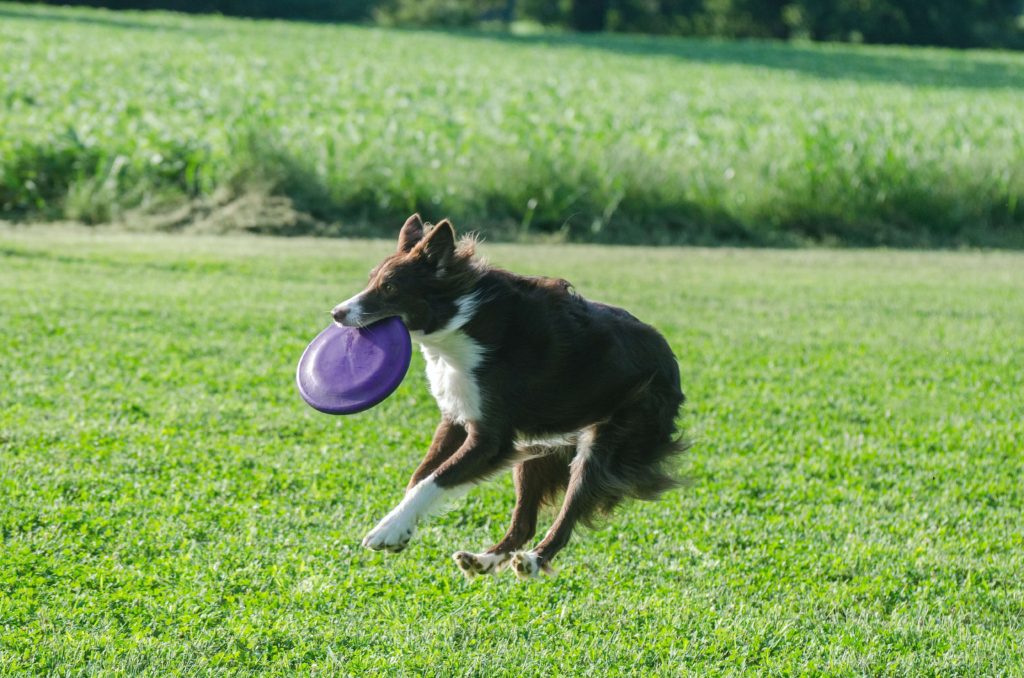What is constipation?
Constipation in dogs is a symptom and it refers to difficult, infrequent, or absent bowel movements. Basically, the dog is incapable of producing normal stools on a regular basis, which, for a dog, is generally once or twice per day. It might be sometimes mistaken by the owner as a urinary disorder. In this article, we will explore the physical and metaphysical causes for constipation in dogs, and of course the remedies.
What Are the Signs of Dog Constipation?
The obvious one is when your dog hasn’t defecated for 2 days or more. When he tries to defecate he might seem nervous and anxious, sometimes even in pain and crying. He makes a few attempts without success or if he does succeed the stool is small and dry which almost resembles small rocks. Often after a few trials without success, it is not uncommon to notice some liquid with blood.
The longer it stays in the digestive tract, the more water is absorbed and the fecal material becomes harder and dryer till the dog cannot defecate at all. This is known as obstipation.
What are the possible causes of constipation?
The most common cause is the ingestion of irritating or indigestible substances.
Diet
As we, humans, need fiber in our diets for proper digestion, so do dogs. A lack of fiber may cause a slowing down of the proper peristalsis of the digestive tract and thus a longer permanence of the stool in the colon.
Apart from the wrong diet, dogs are also known for ingesting all kinds of stuff like toys, bones, pieces of cloths, stones. All these can get stuck somewhere in the digestive tract and slow or even block the passage of stool.
Stress
Sometimes, when dogs feel uncertain in a new environment, with a new owner, or in the vet clinic, he will voluntarily hold himself from passing stool. His mental and emotional states have a great impact on his parasympathetic system, which in a relaxed state permits proper digestion.
Lack of exercise
As for us humans, exercise helps metabolism. If your dog is not doing his regular activity lately it’s normal that his digestion will also slow down. If this is the case, some physical activity like running or a long walk can resolve the problem.

Anal sacs- enlarged or blocked
This can sometimes happen when the dog is experiencing chronic diarrhea and the anal sacs don’t have the time to empty and release their content with the stool. If your dog has diarrhea find out the cause and treat it.
Enlarged prostate gland
Mostly in non-castrated males as it is regulated by hormones, more specifically, testosterone.
Pain
Pain is also known to cause constipation. It can either be a general pain like after an intervention, orthopedic problems that prevent them from assuming the right posture for defecation, or related to the anal region. For example; pelvic fractures, inflammation, or tumors in the perianal region. Even the perianal glands when full and enlarged can cause so much pain the dog will rather hold the stool than facing the pain of pushing.
Obstruction
Obstruction can be from inside as from outside the lumen of the intestine. As for inside obstructions, we already considered a foreign object ingested by the dog. Other than that we can talk about fixed obstruction like a tumor or scar tissue.
On the other hand, obstruction from outside the lumen can be due to extraluminal tumors, enlarged organs pressing against the wall, bone fracture, and more.
Neurological
By neurological causes, we either speak about the central nervous system, which when injured can cause posture abnormalities that make it difficult for the dog to defecate, or about the direct innervation of the tract itself.
Metabolic
Some metabolic disorders can cause constipation in dogs such as hypothyroidism- slows down the metabolism. Kidney failure- causes dehydration, electrolytic imbalance, and obesity.
Medication
That includes opiates, diuretics, antihistamines, some antacids, certain cancer drugs.
Older age
Are older dogs more susceptible?
It seems older dogs are more predisposed to constipation than younger dogs.
What tests will be performed on my dog?
As a first thing, the vet will ask you some questions just to have a better idea about the situation. Then he will perform abdominal palpation and an x-ray. With the x-ray, he will be able to have a clearer picture of the digestive tract’s situation. The presence of gas, fecal material, enlargement of the colon, the overall state of the abdominal organs, and the vertebral column, foreign objects (radiopaque). To have a more specific diagnosis he might also perform an ultrasound exam to identify inside or outside obstruction. In certain situations, a Tac might be requested.
What is the correct therapy?
Like for all symptoms, it depends on the cause. As you saw, the causes are many and you cannot affront a tumor with vaseline oil so it’s important to know the cause. Obviously, if we are only talking about a few days of constipation as opposed to a chronic condition, the first thing you’ll want to do is give him a more suitable diet. Preferably, wet canned food, which is higher in its water content, high fiber content (try pumpkin, it’s quite tasty for them ) hydration, and sometimes laxatives. Then, keep him monitored, and if the situation persists go further with the investigation.
Do natural remedies exist to help constipation?

As we said, pumpkin is great.
Fibers: soluble and insoluble. They are both beneficial although in a different way. Soluble fibers can capture water and form a gel-like substance which can easily be passed in the digestive tract capturing with it other substances and thus ” cleaning the intestines”. The downside is that they can cause fluctuation and abdominal cramps, therefore keep the quantity moderated. On the other hand, insoluble fibers just pass without being digested and have a better laxative effect.
Get a mixture of fibers and add to your dog’s food.
Can I give my dog laxatives? Are they safe?
There are different types of laxatives and each one operated in a different way. These are:
- Emollient agents (stool softeners)
- Lubricant agents
- Hyperosmotic agents
- Saline laxative agents
- Stimulant agents
- Bulk-forming agents
It is important to consult a vet prior to administrating any kind of laxative because in case of, for example, obstruction by a foreign object, a stimulant agent that stimulates peristaltic action, which is not appropriate in this case and even very dangerous.
The metaphysical meaning of constipation
As we know, there is always a deeper meaning to our illnesses. Your dog is experiencing constipation which is a symptom. What is his body communicating to you? It might concern his well being or emotions or yours. Animals are also greatly affected by our mental and emotional states so if a particular situation occurs to them you should also consider how your life is and how you feel.
Any symptom is practically a magnification of the cause. That means, how the symptom makes you feel is really the main cause of the symptom. For example; if I have lower back pain I might feel blocked to do the things I really want to do. Then, I know that this feeling of not being able to do what I want, IS the cause, it was magnified and became physical. The beauty of it, of how the body speaks to you, is by letting you know in a clearer and “out loud” way- “This is how you feel and it is not serving you in life”. This IS the cause.
To look for the emotional/mental cause of your symptom or your pet’s symptom, consider:
-What’s the symptom. In this case; constipation.
-How does this symptom make you feel; Blocked, with the need to release.
-The cause; Inability to release something (is it old patters or habits, are these emotions, only you know that, ask yourself questions).
To go to an even deeper understanding consider that this emotional/mental cause is also a symptom.
The real cause Is a trauma (big or small) that has created resistance in one (or more) of your chakras. The resistance is like a block for the perfect flow, and this is the reason why symptoms are manifested within different body parts in different individuals. It depends on where the weakness is.
So also consider for a broder healing:
Where is the resistance – which chakra? and how to heal it (meditation, reiki, and more)
In the case of constipation, we are talking about the colon, associated with the root chakra.
Please, let me know your thought, your doubts, if you have any questions, some topics I did not cover, contact me, I will be happy to help!




